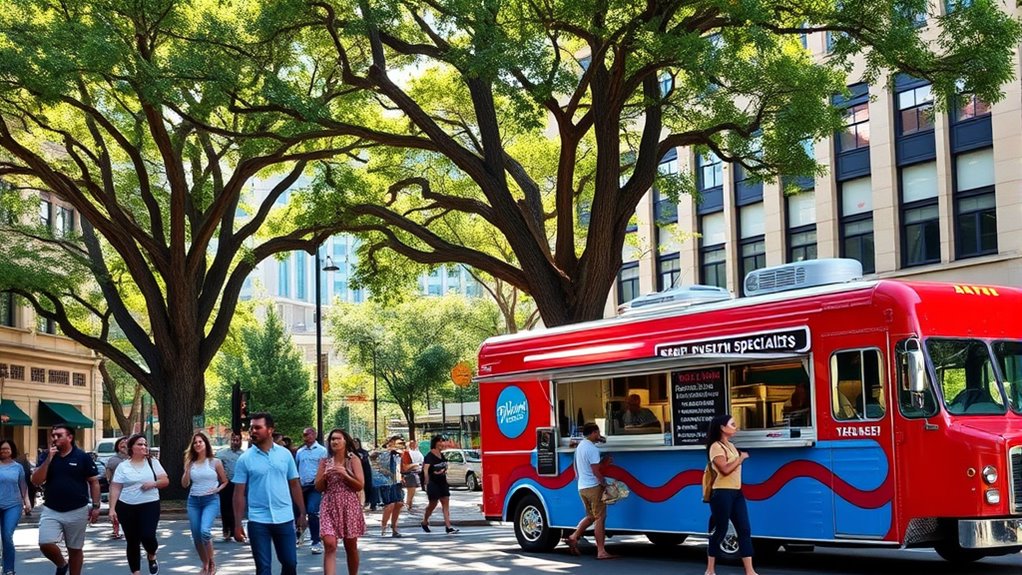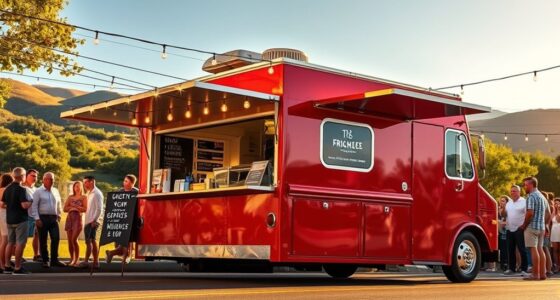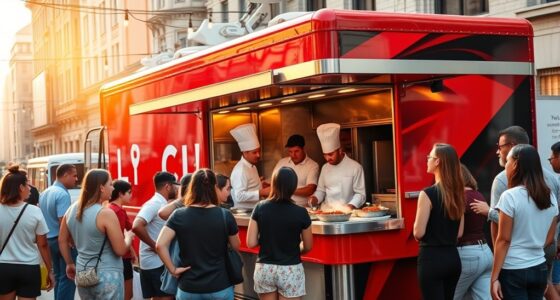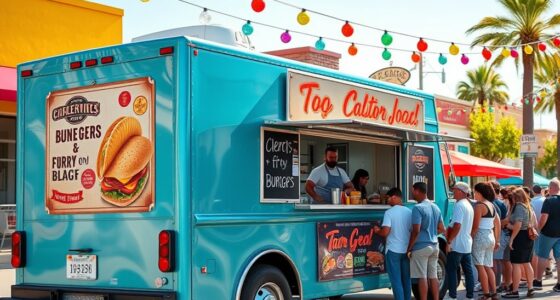To start a food truck in Atlanta, GA, you need to obtain the necessary licenses and permits, such as a business license and health permits, through Atlanta’s online portal. Develop a solid operation plan, including budgeting, equipment, and menu design featuring local ingredients. Focus on marketing your brand at festivals and through social media to build loyalty. Following these steps will set a strong foundation, and exploring more details will help guarantee your success.
Key Takeaways
- Obtain necessary permits, licenses, and health inspections through Atlanta’s online permit portal to operate legally.
- Plan and design a compliant kitchen layout with essential equipment to ensure safety and efficiency.
- Develop a unique menu featuring local ingredients, and establish a strong social media presence for marketing.
- Apply for local small business grants and engage with the community through festivals and events.
- Maintain food safety standards, quality, and consistency to build customer loyalty and ensure long-term success.
Starting With a Food Truck License
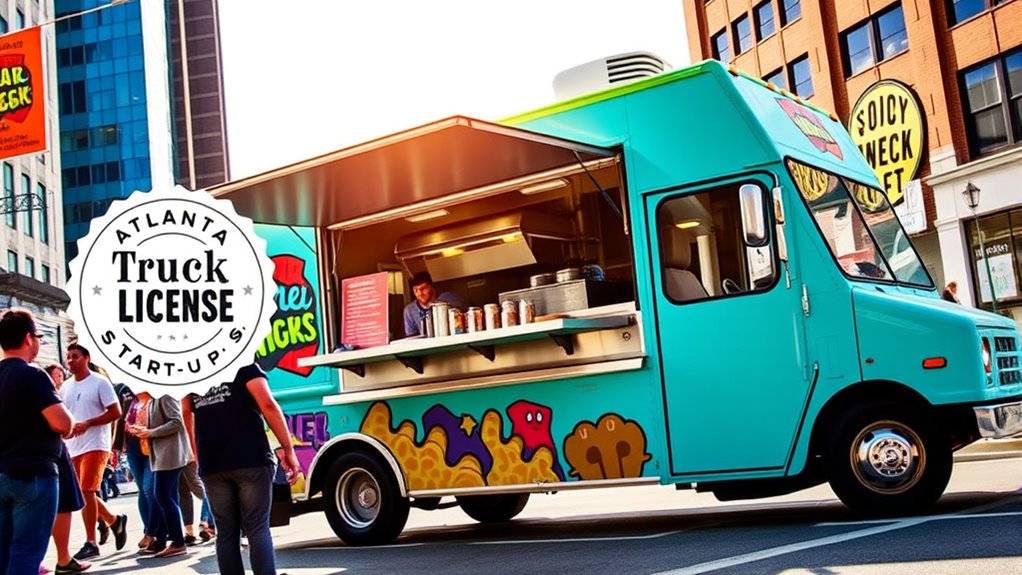
Getting your food truck license is the first step to launching your mobile food business in Atlanta. To do this, you’ll need to navigate the food truck permits and licensing process required by local authorities. Start by researching the specific permits needed for operating in Atlanta, which often include a general business license and health permits. The licensing process involves submitting applications, providing proof of insurance, and passing health inspections. Make sure you gather all necessary documentation beforehand to avoid delays. Once approved, you’ll receive your food truck permits, allowing you to legally serve food on the go. Securing your license early ensures you comply with regulations and sets a solid foundation for your food truck venture. Additionally, understanding regulatory compliance is crucial, as local laws may include specific requirements for food safety and operations.
Understanding Local Requirements
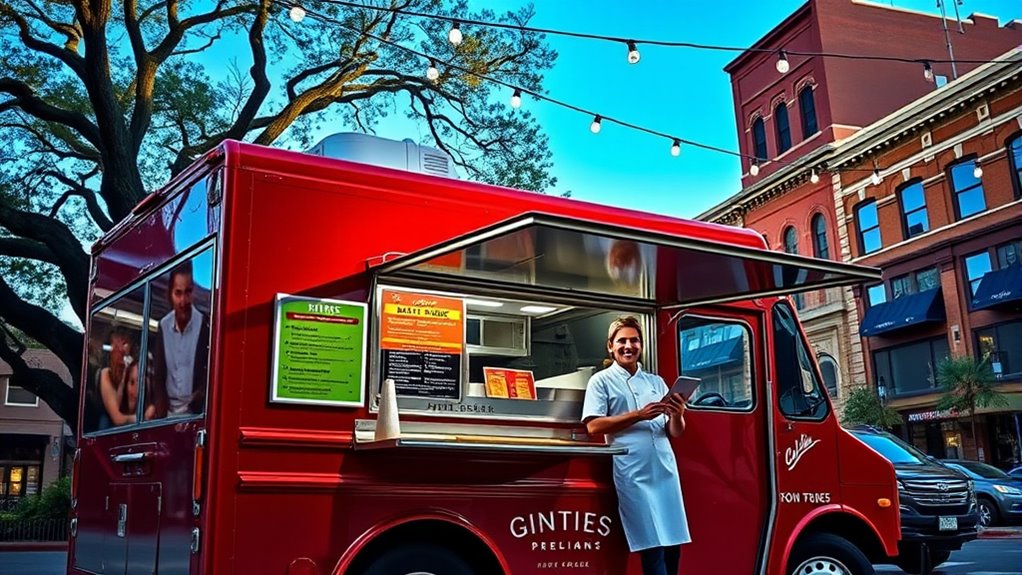
To get your food truck up and running in Atlanta, you’ll need to navigate the online permit application portal and make certain you meet all sanitation standards. Knowing where you can park, such as designated street zones, is essential to stay compliant. Staying informed about local requirements helps you avoid fines and keeps your business running smoothly. Additionally, understanding health regulations related to food handling and cleanliness is crucial for a successful operation.
Online Permit Application Portal
Exploring Atlanta’s online permit application portal is a straightforward process that helps you understand and meet local requirements efficiently. The permit portal streamlines digital compliance, making it easier to submit applications and track progress. When using the portal, you can:
- Access all necessary forms in one place
- Upload supporting documents quickly
- Receive real-time updates on application status
- Pay fees securely online
- Review local regulations and guidelines
Familiarizing yourself with the permit portal guarantees you stay compliant with Atlanta’s regulations. The portal simplifies the permit process, saving you time and reducing errors. By regularly checking the portal, you stay informed about any additional requirements or updates. This digital approach helps you stay organized and prepared as you move forward with your food truck startup.
Sanitation Standards and Inspection Tips
Understanding Atlanta’s sanitation standards and inspection requirements is essential for ensuring your food truck complies with local health regulations. To maintain proper food safety, familiarize yourself with the inspection checklist used by health inspectors. This checklist covers critical areas like proper food storage, clean surfaces, and pest control. Regularly review and update your sanitation procedures to meet Atlanta’s standards. Keep all equipment sanitized, and ensure waste disposal is handled correctly. Conduct self-inspections before official visits to identify and fix issues proactively. Staying compliant not only prevents violations but also builds customer trust. Remember, consistent adherence to sanitation standards is key to passing inspections and running a successful food truck in Atlanta.
Designated Street Parking Zones
Finding your way through Atlanta’s street parking zones is crucial for operating your food truck legally and efficiently. You must understand designated street parking zones, which are clearly marked by street signage. These zones specify where you can park without violating parking enforcement rules. Pay close attention to signs indicating time limits, restricted hours, or permit requirements. Violating these regulations can lead to fines or towing. To stay compliant:
- Check street signage for parking restrictions
- Know the designated zones for food trucks
- Observe parking enforcement notices
- Reserve permits if necessary
- Avoid illegal or unmarked areas
Staying informed helps you avoid penalties and ensures smooth daily operations. Properly parking within designated zones also demonstrates professionalism and respect for local regulations.
Setting Up Your Base of Operations
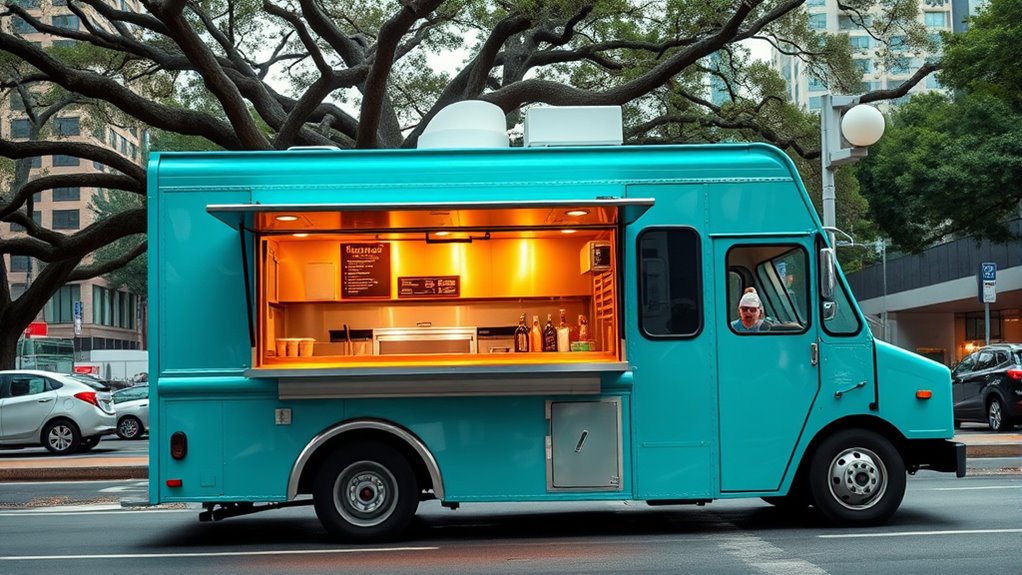
Choosing the right shared kitchen licensing options can save you time and money, so it’s worth exploring local facilities that fit your needs. Planning a custom kitchen layout guarantees your space meets both your menu demands and safety standards. Additionally, ensuring that your kitchen environment minimizes exposure to spoiled ingredients can help maintain food quality and safety standards. By focusing on these aspects, you’ll set a solid foundation for your food truck operations in Atlanta.
Shared Kitchen Licensing Options
Setting up your food truck often involves selecting a shared kitchen, which can streamline your operations and reduce costs. Shared kitchens offer flexible licensing options, making it easier to comply with local regulations. These facilities typically provide necessary equipment, storage, and health permits, simplifying your startup process.
Consider these licensing options when choosing a shared kitchen:
- Commercial kitchen permits
- Food service licenses
- Health department approvals
- Business licenses
- Fire safety certifications
Custom Kitchen Layout Planning
Once you’ve selected a shared kitchen space, designing a custom layout guarantees your food truck operates efficiently and safely. Custom kitchen design focuses on layout optimization, ensuring every inch maximizes productivity. By carefully planning your setup, you reduce movement, save time, and enhance safety. Think about how equipment flows, where ingredients are stored, and how staff moves between stations. A well-optimized layout creates a smooth operation that boosts customer satisfaction and minimizes mistakes. Use this table to visualize your space:
| Zone | Purpose |
|---|---|
| Prep Area | Chopping, assembling dishes |
| Cooking Zone | Grilling, frying, reheating |
| Storage | Ingredients, supplies |
| Service Counter | Customer orders, pickups |
This strategic approach to layout optimization makes your food truck a well-oiled machine.
Budgeting and Financing Your Food Truck

Budgeting for your food truck involves understanding your initial equipment costs and exploring local small business grants that can facilitate expenses. You’ll also need to factor in liability coverage to protect your investment and comply with regulations. Getting these financial pieces in place helps ensure your truck’s success from the start. Additionally, applying smart marketing strategies can help you reach your target audience effectively and boost sales from day one brand visibility.
Initial Equipment Purchase Costs
Starting your food truck venture requires a clear understanding of initial equipment purchase costs. These expenses include essential items to get your business running smoothly. Key investments involve purchasing the truck and outfitting it with cooking equipment, refrigeration, and serving tools. Don’t forget to budget for trailer maintenance to keep your truck in top shape and prevent costly repairs later. Effective truck branding, such as custom wraps and signage, helps attract customers and builds your brand identity. Additional costs may include point-of-sale systems and safety equipment. Being prepared for these expenses guarantees you won’t be caught off guard. Carefully planning your equipment investments will set a solid foundation for your food truck’s success in Atlanta.
Local Small Business Grants
Are local small business grants a viable way to finance your food truck in Atlanta? They can be a great option if you qualify, providing funds that don’t require repayment. These grants can cover expenses like food truck branding, helping you create a memorable identity that attracts customers. Additionally, you can use some of the funds to boost your social media marketing efforts, increasing your visibility in the local food scene. Applying for grants involves researching opportunities, preparing a solid business plan, and highlighting your unique value proposition. Keep in mind that grants are competitive, so presenting a clear vision and demonstrating your commitment to the community can improve your chances. With the right approach, grants can considerably ease your budgeting process and fuel your food truck’s growth.
Liability Coverage for Food Trucks
Liability coverage is a crucial aspect of financing your food truck because it protects you from costly legal claims and damages. Knowing the insurance requirements helps you avoid gaps in coverage that could jeopardize your business. Adequate liability coverage ensures you’re protected against accidents, injuries, or property damage related to your truck. When budgeting, consider these key points:
- Compliance with local insurance requirements
- Coverage for bodily injury and property damage
- Protection against customer or third-party claims
- Costs associated with liability coverage premiums
- Additional coverage options for equipment and inventory
Having proper liability coverage not only safeguards your assets but also boosts customer trust. Make sure you understand your insurance requirements and select a policy that offers extensive liability coverage tailored to your food truck operation.
Designing Your Menu and Pricing Strategy
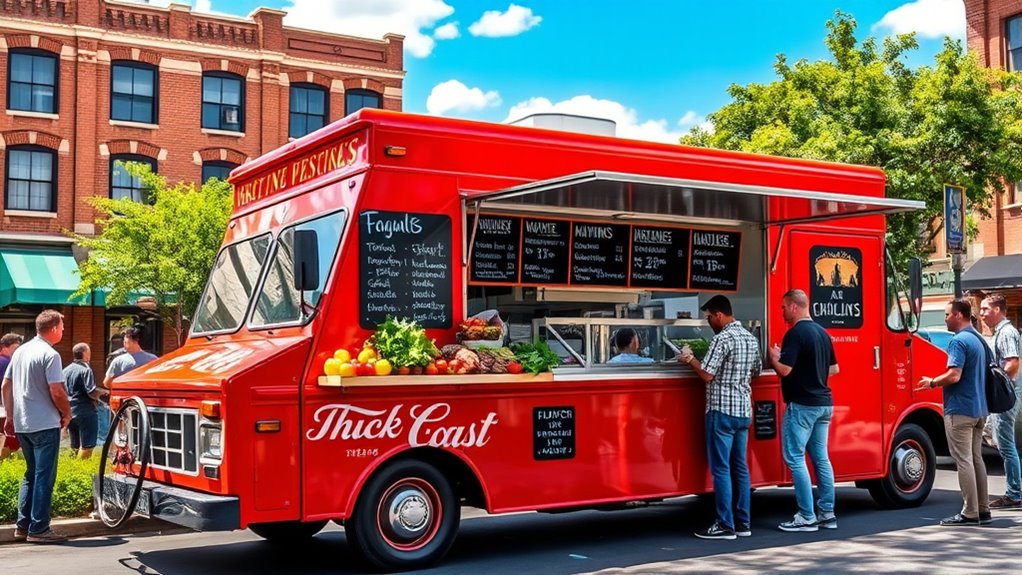
When designing your menu, consider using locally sourced ingredients to appeal to health-conscious customers and support nearby farmers. Setting your prices with flexible strategies allows you to adapt to different events and customer preferences. Balancing quality, cost, and uniqueness helps guarantee your food truck stands out and remains profitable. Incorporating strategic planning into your pricing and menu development can further enhance your business’s adaptability and growth potential.
Locally Sourced Ingredient Sourcing
Using locally sourced ingredients can profoundly influence your menu design and pricing strategy, as fresh, regional products often come with higher costs but offer unique flavors that attract customers. Building strong sourcing partnerships ensures consistent ingredient quality and reliable supply. Focus on establishing relationships with local farmers, markets, and suppliers to access seasonal produce and specialty items. This approach allows you to craft dishes that highlight the region’s flavors and differentiate your food truck. Keep in mind that higher ingredient costs may require adjusting your menu prices to maintain profitability. Consider featuring a rotating selection of seasonal specials to showcase local ingredients. This strategy not only supports the community but also appeals to customers seeking authentic, fresh, and high-quality food options.
Customized Menu Pricing Strategies
Incorporating locally sourced ingredients into your menu offers unique flavors that can set your food truck apart, but it also requires careful planning around pricing. To maximize profit, focus on menu diversification by offering a variety of dishes at different price points. Understanding pricing elasticity helps you gauge how customers might respond to price changes—lower prices can boost sales volume, while higher prices can increase profit margins if demand is inelastic. Experiment with combo meals or seasonal specials to adjust prices strategically. Keep an eye on competitor pricing and customer feedback to fine-tune your strategies. This approach ensures your menu remains appealing and profitable, balancing quality with affordability while highlighting your food truck’s distinctiveness.
Technology and Operations
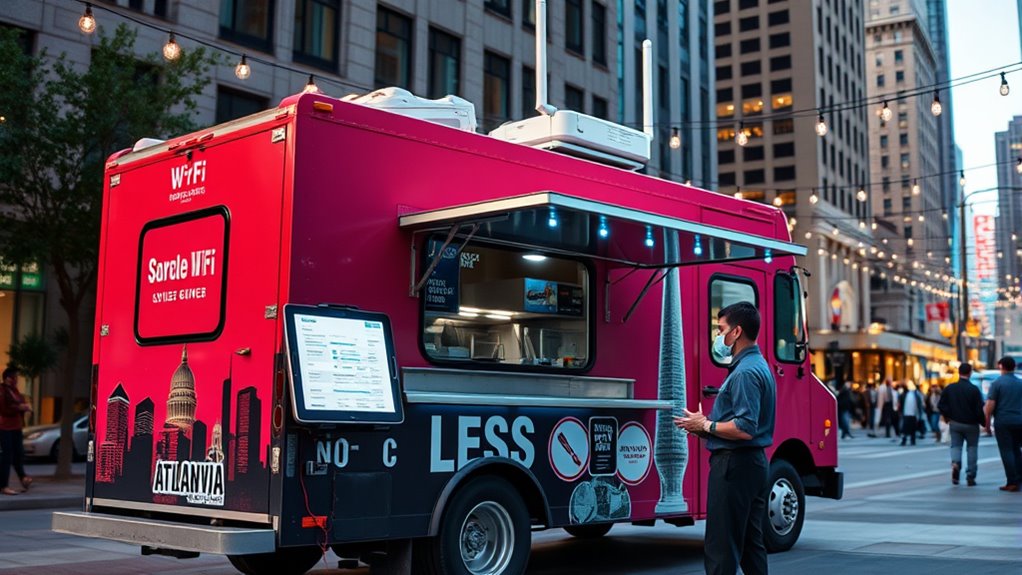
You’ll want to explore wireless card readers and apps to speed up transactions and reduce errors. Mobile POS systems help you manage orders and sales on the go, keeping your operations smooth. Additionally, stock tracking tools guarantee you stay on top of inventory, so you’re always prepared for busy days.
Wireless Card Readers and Apps
Wireless card readers and apps have revolutionized how food trucks handle transactions, making payments faster and more secure. With wireless card readers, you no longer need bulky equipment or wired connections, streamlining your setup. Mobile payment apps offer customers multiple ways to pay, including contactless options, which boost convenience and reduce wait times. These tools also help you track sales in real-time, simplifying bookkeeping. Additionally, they improve security by encrypting sensitive payment data, reducing the risk of fraud. Here are some benefits:
- Easy integration with existing POS systems
- Faster checkout process
- Enhanced security features
- Support for multiple payment methods
- Increased customer satisfaction
Embracing wireless card readers and mobile payment apps is essential for staying competitive in Atlanta’s bustling food truck scene.
Mobile POS and Stock Tracking
How can mobile POS systems and stock tracking enhance your food truck’s efficiency? A mobile POS allows you to process payments quickly and accurately, reducing wait times and improving customer satisfaction. It also streamlines order management, so you can serve more customers in less time. Stock tracking integrated with your mobile POS helps monitor inventory levels in real-time, preventing shortages or overstocking. This ensures you always have the right ingredients on hand and minimizes waste. With these tools, you gain better control over sales data and inventory, enabling smarter purchasing decisions. Overall, mobile POS and stock tracking work together to optimize your operations, save time, and boost profitability—making your food truck more efficient and responsive to customer needs.
Marketing and Growing Your Presence
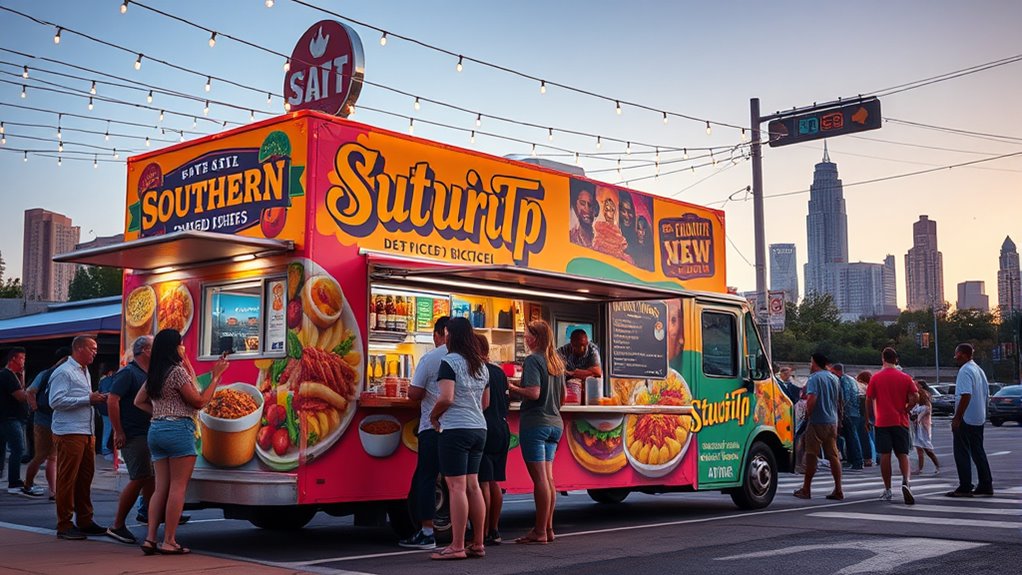
To boost your food truck’s visibility, focus on participating in popular local event venues and food festivals. These gatherings attract large crowds enthusiastic to try new flavors, giving you a great opportunity to grow your customer base. Promotions at these events can turn first-time visitors into loyal fans.
Popular Local Event Venues
Choosing the right local event venues can substantially boost your food truck’s visibility and customer base in Atlanta. Popular spots like farmers markets, street fairs, music festivals, sports events, and outdoor concerts attract diverse crowds enthusiastic to try new foods. These venues provide excellent opportunities to strengthen your food truck branding and showcase your unique offerings. Use social media marketing to announce your appearances and engage with attendees in real-time. Collaborate with event organizers for special promotions or discounts to draw more customers. Consider hosting themed days or partnerships with local businesses to build loyalty. By strategically selecting venues and maximizing your social media presence, you’ll turn casual passersby into loyal patrons, making your food truck a staple in Atlanta’s vibrant event scene.
Local Food Festivals and Promotions
Participating in local food festivals and promotions is a powerful way to boost your food truck’s visibility and attract new customers in Atlanta. Food festival participation allows you to showcase your menu to diverse crowds, build brand recognition, and generate buzz. Offering promotional discounts at these events encourages first-time visitors to try your offerings and become loyal patrons. To maximize impact, plan your festival schedule carefully and create eye-catching signage. Consider partnering with local events to gain more exposure. Use the table below to understand the benefits and strategies of food festival participation:
| Benefit | Strategy |
|---|---|
| Increased visibility | Engage with attendees actively |
| Customer loyalty | Offer exclusive promotional discounts |
| Brand recognition | Participate regularly in key events |
Atlanta Food Truck Success Tips
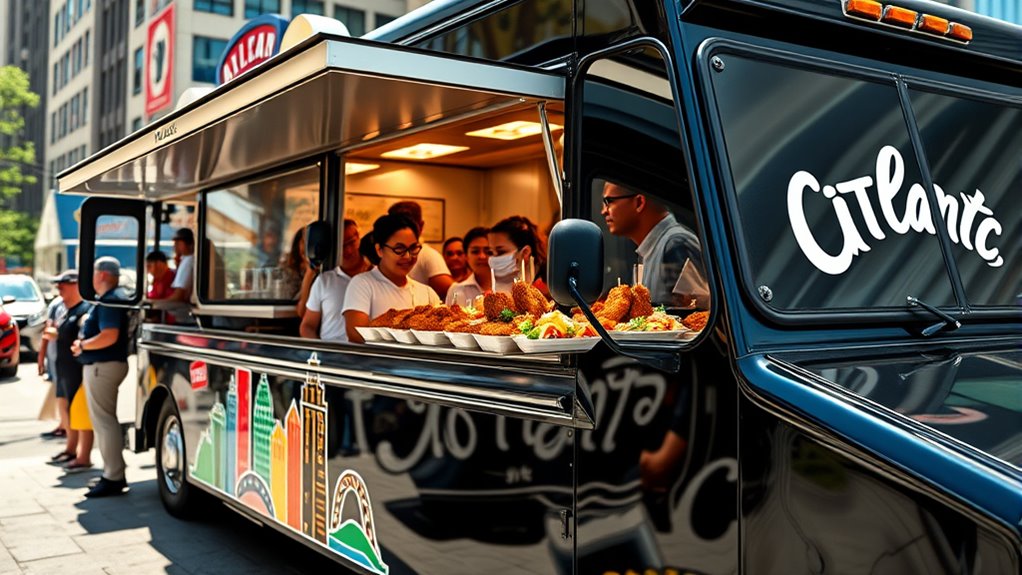
Launching a successful food truck in Atlanta requires more than just great food; it demands strategic planning and local insight. To stand out in Atlanta’s vibrant street food scene, stay current with culinary trends and connect with your community. Focus on offering unique, flavorful dishes that reflect Atlanta’s diverse palate. Build a strong brand and engage with your audience on social media. Always prioritize quality and consistency to attract repeat customers. Additionally, adapt quickly to customer feedback and industry shifts.
To succeed in Atlanta’s street food scene, stay trendy, connect locally, and prioritize quality and community engagement.
Here are some success tips:
- Keep up with evolving culinary trends
- Highlight local ingredients and flavors
- Participate in street food festivals
- Offer innovative menu items
- Build relationships with local vendors
Frequently Asked Questions
What Permits Are Needed for Outdoor Food Service in Atlanta?
You’ll need a food service permit from the Atlanta Health Department and a mobile food vendor permit. Make sure your food truck has proper food truck insurance to protect against liabilities. Check parking regulations to guarantee you’re parked legally and avoid fines. Also, secure any necessary fire permits and health inspections. Staying compliant with these permits and regulations keeps your outdoor food service running smoothly and legally in Atlanta.
How Do I Choose the Best Location for My Food Truck?
Finding the perfect spot for your food truck starts with scouting high-traffic hubs like busy downtowns, bustling events, or popular parks. Consider your marketing strategies to attract a steady stream of customers, and tailor your truck design to stand out in vibrant locations. Stay flexible, observe foot traffic patterns, and choose a location where visibility and vibrancy align with your brand, ensuring your tasty treats reach enthusiastic eaters.
What Are Common Challenges Faced by New Atlanta Food Truck Owners?
As a new Atlanta food truck owner, you’ll face challenges like maintaining your food truck and managing food truck maintenance to guarantee smooth operations. Balancing menu design to appeal to local tastes can be tricky, and attracting customers requires strategic marketing. Additionally, steering city regulations and finding reliable suppliers can be tough. Staying adaptable and organized helps you overcome these common hurdles and grow your food truck business.
How Can I Build a Loyal Customer Base Quickly?
Think of building your customer base as planting a garden—you need consistent care and attention. Use social media to share your daily specials, behind-the-scenes moments, and customer shout-outs to create a buzz. Engage with your community, offer loyalty rewards, and encourage reviews. By staying active and authentic online, you foster customer loyalty, turning first-time visitors into regulars who keep coming back, helping your food truck thrive in Atlanta.
Are There Local Food Truck Associations or Networks in Atlanta?
Yes, there are food truck associations and networks in Atlanta that can help you grow. You can join local groups that organize food truck events and provide networking opportunities. Attending these events allows you to meet other vendors, share tips, and build your customer base quickly. Being part of such networks boosts your visibility and helps you stay connected with the vibrant Atlanta food scene.
Conclusion
Starting your food truck in Atlanta isn’t just a business—it’s the secret weapon to conquering the city’s bustling food scene! With the right licenses, killer menu, and a sprinkle of marketing magic, you’ll be serving up success faster than you can say “Atlanta’s best bites.” Get ready to turn heads, fill stomachs, and maybe even become Atlanta’s next legendary foodie icon. Your food truck adventure is about to become the stuff of legends!
